| Listing 1 - 10 of 10 |
Sort by
|
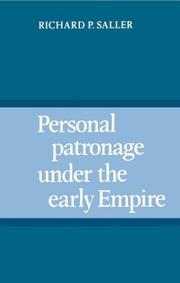
ISBN: 0521233003 0521893925 0511096771 0511583613 9780521233002 9780511583612 9780521893923 Year: 1982 Publisher: Cambridge Cambridge University Press
Abstract | Keywords | Export | Availability | Bookmark
 Loading...
Loading...Choose an application
- Reference Manager
- EndNote
- RefWorks (Direct export to RefWorks)
Personal patronage was an accepted element in the functioning of Roman society. It is usually considered to be a particularly Republican phenomenon, which declined as other mechanisms developed with the growth of the imperial bureaucracy. Dr Saller's book, the first major study of patronage in the early Empire, shows that the patron-client relationship continued on much the same basis into the third century AD. Drawing on literary and epigraphic sources, he examines the language and ideology of the patron-client exchange, and then investigates how the exchange functioned in the political, economic and social life of the Roman world from the imperial court to the subjects in the provinces. A case study of North Africa illustrates the importance of patronage relationships in a province which produced many members of the new bureaucracy and also eventually an emperor, with consequences for the range of patronage bonds.
Patron and client --- Patron et client --- Rome --- Politics and government --- Politique et gouvernement --- -Clientela --- Clientelism --- Patronage, Roman --- Politics and government. --- -Rome --- Clientela --- Arts and Humanities --- History --- Patron and client - Rome --- Rome - Politics and government
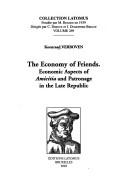
ISBN: 2870312105 9782870312100 Year: 2002 Volume: 269 Publisher: Bruxelles: Latomus,
Abstract | Keywords | Export | Availability | Bookmark
 Loading...
Loading...Choose an application
- Reference Manager
- EndNote
- RefWorks (Direct export to RefWorks)
Patronage, Political --- Patron and client --- Favoritisme --- Patron et client --- Economic aspects --- Aspect économique --- Rome --- Economic conditions --- Conditions économiques --- Economic aspects. --- Economic conditions. --- Aspect économique --- Conditions économiques --- Clientela --- Clientelism --- Patronage, Roman --- Political patronage --- Spoils system --- Civil service reform --- Patronage, Political - Rome - Economic aspects. --- Patron and client - Rome - Economic aspects. --- Patron and client - Rome - Economic aspects --- Rome - Economic conditions --- Clientelism, Political --- Patron-client politics --- Political clientelism --- Political sociology
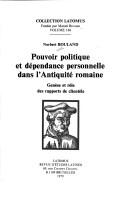
ISBN: 2870311060 9782870311066 Year: 1979 Volume: 166 Publisher: Bruxelles : Éditions Latomus,
Abstract | Keywords | Export | Availability | Bookmark
 Loading...
Loading...Choose an application
- Reference Manager
- EndNote
- RefWorks (Direct export to RefWorks)
Cliens --- Clientela --- Clientelism --- Clientelisme --- Clientes --- Clientèles --- Clientélisme --- Histoire et culture romaines --- Patron and client --- Patronaat --- Patronage [Roman ] --- Patronat --- Patronus en cliens --- Patronus et cliens --- Romeinse geschiedenis en cultuur --- Patron et client --- Rome --- Politics and government --- Politique et gouvernement --- -Clientela --- Patronage, Roman --- Politics and government. --- -Rome --- Patron and client - Rome --- Rome - Politics and government
Book
ISBN: 9789004214668 9004214666 1306210275 9004261710 9789004261716 9781306210270 Year: 2014 Volume: 365 Publisher: Leiden
Abstract | Keywords | Export | Availability | Bookmark
 Loading...
Loading...Choose an application
- Reference Manager
- EndNote
- RefWorks (Direct export to RefWorks)
The Roman Empire may be properly described as a consortium of cities (and not as set of proto national states). From the late Republic and into the Principate, the Roman elite managed the empire through insititutional and personal ties to the communities of the Empire. Especially in the Latin West the emperors encouraged the adoption of the Latin language and urban amenities, and were generous in the award of citizenship. This process, and ‘Romanization’ is a reasonable label, was facilitated by civic patronage. The literary evidence provides a basis for understanding this transformation from subject to citizen and for constructing a higher allegiance to the idea of Rome. We gain a more complete understanding of the process by considering the legal and monumental/epigraphical evidence that guided and encouraged such benefaction and exchange. This book uses all three forms of evidence to provide a deeper understanding of how patrocinium publicum served as a formal vehicle for securing the goodwill of the citizens and subjects of Rome.
Patron and client --- Community life --- Power (Social sciences) --- Patron et client --- Communauté --- Pouvoir (Sciences sociales) --- Rome --- Politics and government --- Social conditions --- Antiquities --- Politique et gouvernement --- Conditions sociales --- Antiquités --- Exchange --- History --- History. --- Social conditions. --- Politics and government. --- Antiquities. --- Communauté --- Antiquités --- Empowerment (Social sciences) --- Political power --- Exchange theory (Sociology) --- Political science --- Social sciences --- Sociology --- Consensus (Social sciences) --- Clientela --- Clientelism --- Patronage, Roman --- Commerce --- Economic anthropology --- Economics --- Supply and demand --- Associations, institutions, etc. --- Human ecology --- Patron and client - Rome - History --- Community life - Rome - History --- Power (Social sciences) - Rome - History --- Exchange - Rome - History --- Rome - Social conditions --- Rome - Politics and government --- Rome - Antiquities
Book
ISBN: 9780814212684 9780814293720 9780814273524 0814212689 0814293727 0814273521 Year: 2014 Publisher: Columbus : Ohio State University Press,
Abstract | Keywords | Export | Availability | Bookmark
 Loading...
Loading...Choose an application
- Reference Manager
- EndNote
- RefWorks (Direct export to RefWorks)
"This book discusses same-sex desire among elite, educated Roman men in late antiquity, when same-sex desire could operate as a distinct vehicle for expressing friendship, patronage, solidarity, and other important relationships. Indeed, a man's grandeur or reputation could be portrayed metaphorically, and with some paradox, as sexual attractiveness. Knowledge of the actual mechanics of same-sex sexual behavior demonstrated that there was nothing the elite classes did not know, even of behaviors that were often frowned on and even criminalized. Since Plato's dialogues were widely read and influential among the educated classes, same-sex attraction/knowledge could also operate as a vehicle for rising to the transcendent"-- "In an analysis that promises to be controversial, Man to Man: Desire, Homosociality, and Authority in Late-Roman Manhood surveys the presence of same-sex desire between men in the later Roman empire. Most accounts of recent years have either noted that sexual desire between men was forbidden or they have ignored it. This book argues that desire between men was known and that it was a way to express friendship, patronage, solidarity, and other important relationships among elite males in late antiquity. The evocation of this desire and its possible attendant corporeal satisfactions made it a compelling metaphor for friendship. A man's grandeur could also be portrayed metaphorically as sexual attractiveness, and the substantial status differences often seen in late antiquity could be ameliorated by a superior using amatory language to address an inferior. At the same time, however, there was a marked ambivalence about same-sex desire and sexual behavior between men, and indeed same-sex sexual behavior was criminalized as it had never been before. While rejection and condemnation may seem to indicate a decisive distancing between authority and this desire and behavior, authority gained power from maintaining a relation to them. Demonstrating knowledge of the actual mechanics of sex between men suggested to a witness that there was nothing unknown to the authority making the demonstration: authority that knew of scandalous masculine sexual pleasure could project its power pretty much anywhere. This startling dissonance between positive uses of same-sex desire between men and its criminalization in one and the same moment-a dissonance which recent discussions have been unable to address-requires further investigation, and this book supplies it"--
Homosexuality --- Patron and client --- Authority --- Elite (Social sciences) --- Homosexualité --- Patron et client --- Autorité --- Elite (Sciences sociales) --- History. --- History --- Histoire --- LITERARY CRITICISM --- Authority. --- Elite (Social sciences). --- Homosexuality. --- Patron and client. --- Ancient & Classical. --- Rome (Empire). --- Elite (social sciences) --- Literary criticism --- Elite (social sciences). --- Ancient & classical. --- Homosexualité --- Autorité --- LITERARY CRITICISM / Ancient & Classical. --- Same-sex attraction --- Sexual orientation --- Bisexuality --- Clientela --- Clientelism --- Patronage, Roman --- Political science --- Authoritarianism --- Consensus (Social sciences) --- Elites (Social sciences) --- Leadership --- Power (Social sciences) --- Social classes --- Social groups --- Homosexuality - Rome - History --- Patron and client - Rome - History --- Authority - History --- Elite (Social sciences) - Rome - History
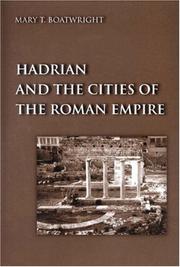
ISBN: 0691048894 9780691048895 0691094934 0691187215 Year: 2000 Publisher: Princeton (N.J.) : Princeton university press,
Abstract | Keywords | Export | Availability | Bookmark
 Loading...
Loading...Choose an application
- Reference Manager
- EndNote
- RefWorks (Direct export to RefWorks)
Cities throughout the Roman Empire flourished during the reign of Hadrian (A.D. 117-138), a phenomenon that not only strengthened and legitimized Roman dominion over its possessions but also revealed Hadrian as a masterful negotiator of power relationships. In this comprehensive investigation into the vibrant urban life that existed under Hadrian's rule, Mary T. Boatwright focuses on the emperor's direct interactions with Rome's cities, exploring the many benefactions for which he was celebrated on coins and in literary works and inscriptions. Although such evidence is often as imprecise as it is laudatory, its collective analysis, undertaken for the first time together with all other related material, reveals that over 130 cities received at least one benefaction directly from Hadrian. The benefactions, mediated by members of the empire's municipal elite, touched all aspects of urban life; they included imperial patronage of temples and hero tombs, engineering projects, promotion of athletic and cultural competitions, settlement of boundary disputes, and remission of taxes. Even as he manifested imperial benevolence, Hadrian reaffirmed the self-sufficiency and traditions of cities from Spain to Syria, the major exception being his harsh treatment of Jerusalem, which sparked the Third Jewish Revolt. Overall, the assembled evidence points to Hadrian's recognition of imperial munificence to cities as essential to the peace and prosperity of the empire. Boatwright's treatment of Hadrian and Rome's cities is unique in that it encompasses events throughout the empire, drawing insights from archaeology and art history as well as literature, economy, and religion.
Emperors --- Patron and client --- Municipal government --- Empereurs --- Patron et client --- Administration municipale --- Biography --- Biographies --- Hadrian, --- Influence. --- Rome --- History --- Histoire --- Cities and towns, Ancient --- Cities and towns --- -Emperors --- -Patron and client --- -Clientela --- Clientelism --- Patronage, Roman --- Rulers --- Sovereigns --- Heads of state --- Kings and rulers --- Monarchy --- Global cities --- Municipalities --- Towns --- Urban areas --- Urban systems --- Human settlements --- Sociology, Urban --- Administration --- Hadrian Emperor of Rome --- -Influence --- -Cities and towns --- Administrative and political divisions. --- -Administration --- Clientela --- Adrian, --- Hadrianus, --- Adriano, --- Hadrien, --- אדריאנוס, --- Emperors - Rome - Biography --- Patron and client - Rome. --- Cities and towns, Ancient - Rome.
Book
ISBN: 3445022097 9783445022097 Year: 1981 Volume: Heft 132 Publisher: Königstein im Taunus Hain
Abstract | Keywords | Export | Availability | Bookmark
 Loading...
Loading...Choose an application
- Reference Manager
- EndNote
- RefWorks (Direct export to RefWorks)
Latin letters --- Patron and client --- Employment references --- Lettres (Genre littéraire) latines --- Patron et client --- History and criticism --- Histoire et critique --- Rome --- Politics and government --- Politique et gouvernement --- Rhetoric, Ancient --- Letter writing, Latin. --- Rhetoric, Ancient. --- History and criticism. --- Politics and government. --- Lettres (Genre littéraire) latines --- Letter writing, Latin --- Ancient rhetoric --- Classical languages --- Greek language --- Greek rhetoric --- Latin language --- Latin rhetoric --- Clientela --- Clientelism --- Patronage, Roman --- Latin letter writing --- Letters of recommendation --- Recommendations for positions --- Reference checks --- References, Employment --- Applications for positions --- Personnel management --- Rhetoric --- Latin letters - History and criticism --- Patron and client - Rome --- Employment references - Rome --- Rome - Politics and government
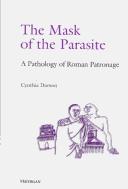
ISBN: 0472107607 9780472107605 Year: 1997 Publisher: Ann Arbor : University of Michigan Press,
Abstract | Keywords | Export | Availability | Bookmark
 Loading...
Loading...Choose an application
- Reference Manager
- EndNote
- RefWorks (Direct export to RefWorks)
Patron and client --- Latin literature --- Authors and patrons --- Literary patrons --- Oratory, Ancient. --- History and criticism. --- -Latin literature --- -Oratory --- -Patron and client --- -Clientela --- Clientelism --- Patronage, Roman --- Argumentation --- Oratory, Primitive --- Speaking --- Language and languages --- Rhetoric --- Speeches, addresses, etc. --- Debates and debating --- Elocution --- Eloquence --- Lectures and lecturing --- Persuasion (Rhetoric) --- Public speaking --- Roman literature --- Classical literature --- Classical philology --- Latin philology --- Literary patronage --- Maecenatism --- Patronage of literature --- Sponsorship of literature --- Art patronage --- Literature and state --- History --- History and criticism --- Rome --- Social conditions. --- -History --- Oratory, Ancient --- Clientela --- Benefactors --- Patron and client - Rome. --- Latin literature - History and criticism. --- Authors and patrons - Rome. --- Literary patrons - Rome.
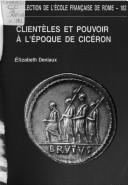
ISBN: 2728302804 9782728302802 Year: 1993 Volume: 182 Publisher: Rome : Ecole française de Rome,
Abstract | Keywords | Export | Availability | Bookmark
 Loading...
Loading...Choose an application
- Reference Manager
- EndNote
- RefWorks (Direct export to RefWorks)
Patron and client --- Patron et client --- Cicero, Marcus Tullius --- Rome --- Politics and government --- Politique et gouvernement --- -Rome --- -320.937 --- Clientela --- Clientelism --- Patronage, Roman --- -Social sciences Political science Ancient Italy --- -Cicero, Marcus Tullius --- -T︠S︡it︠s︡eron, Mark Tulliĭ --- Cyceron --- Cicéron --- Kikerōn --- Cicerón, M. Tulio --- Ḳiḳero --- Cicerone --- Cicerón, Marco Tulio --- Ḳiḳero, Marḳus Ṭulyus --- Tullius Cicero, Marcus --- Kikerōn, M. T. --- Cicerone, M. T. --- Cicerone, M. Tullio --- Cicero --- Cicero, M. T. --- Cyceron, Marek Tulliusz --- ציצרון, מארקוס טולליוס --- קיקרו, מארקוס טוליוס --- קיקרו, מרקוס טוליוס --- キケロ --- 西塞罗 --- Contributions in political science --- Political and social views --- Political and social views. --- -Contributions in political science --- Cicéron, Marcus --- -Cicero --- 320.937 --- Social sciences Political science Ancient Italy --- Correspondence --- Friends and associates --- Employment references --- Republic, 265-30 B.C. --- M. Tulli Ciceronis --- T︠S︡it︠s︡eron, Mark Tulliĭ --- Cicero, Marcus Tullius. --- Patron and client - Rome.
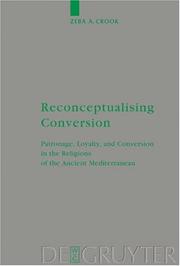
ISBN: 3110182653 311091560X 9783110915600 9783110182651 Year: 2012 Volume: 130 Publisher: Berlin Boston
Abstract | Keywords | Export | Availability | Bookmark
 Loading...
Loading...Choose an application
- Reference Manager
- EndNote
- RefWorks (Direct export to RefWorks)
Die Studie nimmt die bisherige Diskussion der Konversion in der Antike neu auf durch eine Verknüpfung von klassischen, epigraphischen und biblischen Quellen mit einer sozialwissenschaftlichen Methodologie. Der Autor hinterfragt dabei die bisher vorausgesetzte psychologische Kontinuität zwischen antiken und modernen Menschen und bietet statt dessen ein Modell, welches an den Denkvoraussetzungen der Antike selbst gebildet wurde. Die griechisch-römischen und mediterranen Religionen und Philosophien - also auch das hellenistische Judentum und das Christentum - orientierten sich an den Modellen von Patronat und Loyalität. Das Verständnis der antiken Konversion muss also hier ansetzen. In diesem Zusammenhang wird auch die "Bekehrung" des Paulus neu gedeutet. This monograph challenges the dominant psychological assumptions that attend modern treatments of ancient conversion and offers in its place a model based on categories the ancients themselves used: patronage and loyalty.
Psychologie en godsdienst --- Psychologie et religion --- Psychology and religion --- Religion and psychology --- Conversion --- Patron and client --- God --- Worship and love --- Paul, --- 292 --- Godsdiensten van Grieken en Romeinen. Klassieke mythologie --- Paul --- Psychology --- Christianity --- Rome --- Greece --- worship and love --- History of doctrines --- Clientela --- Clientelism --- Patronage, Roman --- Religious conversion --- Pavel, --- Pavol, --- Paulus von Tarsus, --- Paulos, --- Pōghos, --- Paweł, --- Paweł z Tarsu, --- Būlus, --- Pablo, --- Paulo de Tarso, --- Paolo di Tarso, --- Pál, --- Apostolos Paulos --- Saul, --- القديس بولس الرسول --- بولس، --- 사도바울 --- Conversion. --- Religion --- Love --- Worship --- Psychology, Religious --- Proselytizing --- Paulus, --- Pawełm --- Paulo, --- Paolo, --- Psychology and religion. --- Christianity. --- Worship and love. --- Patron and client - Rome --- Patron and client - Greece --- God - Worship and love --- Paul, - the Apostle, Saint - Conversion --- Paul, - the Apostle, Saint
| Listing 1 - 10 of 10 |
Sort by
|

 Search
Search Feedback
Feedback About UniCat
About UniCat  Help
Help News
News